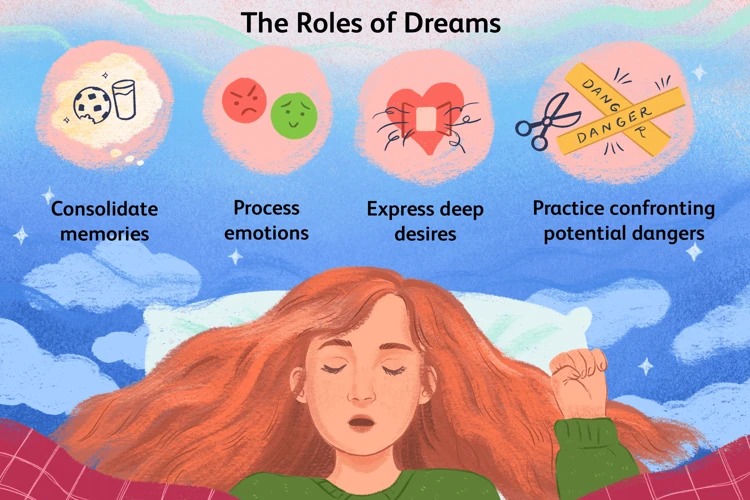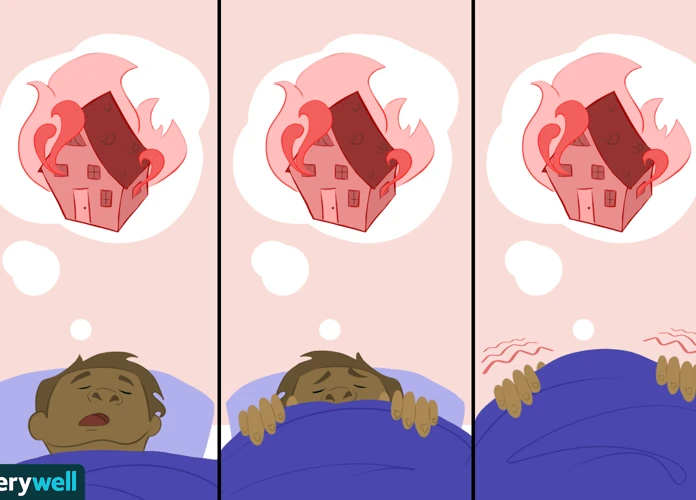What’s Keeping You Up at Night? Understanding and Managing Nightmares – Many of us have experienced the unsettling feeling of waking up from a vivid and distressing dream. Nightmares can leave us feeling anxious, scared, and exhausted, impacting our overall well-being. But what exactly causes these haunting visions to invade our sleep? Are they a reflection of our fears and worries, or is there more to it? In this article, we delve into the mysterious world of nightmares, exploring their causes and providing step-by-step strategies to manage them effectively. Whether you’re seeking relief from recurrent nightmares or simply looking to understand their impact on your mental health, read on to discover practical tips and expert advice that will help you regain peaceful nights and sweet dreams.
What Are Nightmares?

Nightmares are vivid, disturbing dreams that often involve feelings of fear, anxiety, and terror. They typically occur during rapid eye movement (REM) sleep, which is a stage of sleep associated with increased brain activity and intense dreaming. During a nightmare, individuals may experience a range of distressing scenarios, such as being chased, falling, or being trapped. These dreams can feel incredibly real and may leave a lingering sense of unease upon waking. While nightmares are a common occurrence for many people, they can vary in intensity and frequency. Some individuals may only experience occasional nightmares, while others may suffer from recurrent nightmares that disrupt their sleep on a regular basis. Understanding the nature of nightmares is crucial in identifying any underlying causes and developing effective strategies for managing them.
Common Causes of Nightmares

Nightmares can be caused by a variety of factors, both psychological and physiological. Understanding these common causes can help shed light on why certain individuals may be more prone to experiencing distressing dreams. Psychological factors play a significant role in the occurrence of nightmares. Unresolved trauma, anxiety, depression, and other mental health conditions can contribute to the manifestation of unsettling dreams. Stress and anxiety, another common cause, can disrupt sleep patterns and trigger nightmares. Traumatic experiences, such as accidents, abuse, or witnessing a disturbing event, can also lead to the emergence of nightmares. Certain medications or drug use, particularly those that affect brain chemistry and sleep cycles, may provoke nightmares as a side effect. Additionally, sleep disorders like sleep apnea and insomnia can contribute to the development of frequent nightmares. By identifying and addressing these underlying causes, individuals can take proactive steps towards managing and reducing the occurrence of nightmares. To explore more about the psychological meanings behind recurring nightmares, click here.
1. Psychological Factors
Nightmares can often be linked to various psychological factors that impact our mental well-being. Here are some common psychological factors that may contribute to the occurrence of nightmares:
– Stress and Anxiety: High levels of stress and anxiety can increase the likelihood of experiencing nightmares. When we are stressed, our minds often process these emotions during sleep, leading to vivid and unsettling dreams. Anxiety disorders, such as generalized anxiety disorder or post-traumatic stress disorder (PTSD), can also contribute to the frequency and intensity of nightmares. Addressing and managing stress and anxiety can help reduce the occurrence of these distressing dreams. Learn more about differentiating between normal nightmares and nightmare disorders.
– Psychological Trauma: Individuals who have experienced psychological trauma may be more prone to nightmares. Traumatic experiences, such as accidents, abuse, or witnessing violence, can manifest in dreams as a way for the mind to process and cope with the emotional distress. Nightmares related to trauma can be particularly intense and may be a symptom of post-traumatic stress disorder (PTSD). It is essential for individuals who have experienced trauma to seek proper support and therapy to address and manage their nightmares effectively. Read more about analyzing nightmares in adults.
– Psychiatric Disorders: Certain psychiatric conditions, such as depression, bipolar disorder, and schizophrenia, can contribute to the occurrence of nightmares. Imbalances in brain chemistry and disrupted sleep patterns associated with these disorders can affect dream content and increase the likelihood of experiencing disturbing dreams. Managing the underlying psychiatric condition through medication, therapy, and lifestyle adjustments can help alleviate the frequency and intensity of nightmares.
It’s important to note that while psychological factors can contribute to nightmares, they may not be the sole cause. It’s often a combination of factors, including physical health, medications, and sleep disorders, that contribute to the occurrence of distressing dreams. Identifying and addressing these factors can be crucial in effectively managing nightmares and improving overall sleep quality.
2. Stress and Anxiety
Stress and anxiety play a significant role in the occurrence of nightmares. When we are under stress, our minds can become preoccupied with worry and fear, which can manifest in our dreams. High levels of stress can increase the frequency and intensity of nightmares, making them more vivid and disturbing. Anxiety, whether related to specific situations or generalized, can also contribute to nightmares. The heightened arousal and hyperactivity of the mind during anxious periods can spill over into our dreams, creating unsettling scenarios. Additionally, traumatic experiences, such as accidents or abuse, can trigger post-traumatic stress disorder (PTSD) and result in recurring nightmares related to the traumatic event. It is crucial to address and manage stress and anxiety in order to reduce the occurrence of nightmares. This can be done through relaxation techniques such as deep breathing exercises, meditation, or engaging in activities that promote relaxation and stress reduction, such as yoga or taking a warm bath before bed. Seeking support from a therapist can also be beneficial in managing stress and anxiety, as they can provide tools and coping mechanisms to help reduce the impact of these factors on your sleep and overall well-being.
3. Traumatic Experiences
Traumatic experiences can have a profound impact on our mental health, and they can also contribute to the occurrence of nightmares. When we go through trauma, whether it’s a single event or an ongoing situation, our minds may struggle to process and cope with the emotions and memories associated with the experience. Nightmares can often serve as a way for our subconscious to try to make sense of and process these traumatic events. These nightmares may be vivid and realistic, replaying the traumatic event or incorporating its themes and emotions. For individuals who have experienced trauma, nightmares can serve as a reminder of the distressing event, triggering feelings of fear, helplessness, and anxiety. It’s important to recognize that nightmares related to trauma can be particularly distressing and may require specialized support and therapy to address the underlying trauma and the recurring nightmares. If you have experienced trauma and are regularly plagued by nightmares, seeking the guidance of a mental health professional or therapist trained in trauma can be instrumental in helping you navigate and heal from these experiences.
4. Medications or Drug Use
Medications or Drug Use – Certain medications and substances can contribute to the occurrence of nightmares. Some prescription medications, such as antidepressants, antipsychotics, and blood pressure medications, have been known to affect sleep patterns and increase the likelihood of experiencing nightmares. Additionally, recreational drug use, including substances like marijuana, LSD, and cocaine, can disrupt normal sleep cycles and lead to vivid and unsettling dreams. These substances can alter brain chemistry and interfere with the brain’s ability to regulate sleep and dreaming processes. It is important for individuals taking medications or engaging in drug use to be aware of the potential side effects and discuss any concerns with their healthcare provider. Properly managing medications and avoiding substance abuse can help minimize the occurrence of nightmares associated with these factors.
5. Sleep Disorders
Sleep Disorders can play a significant role in the occurrence of nightmares. Certain sleep disorders disrupt the normal sleep cycle and can lead to an increased likelihood of experiencing nightmares. One example is sleep apnea, a condition characterized by interrupted breathing during sleep. The interruptions in breathing can cause sudden awakenings, which in turn can trigger intense and vivid dreams, including nightmares. Another sleep disorder that can contribute to nightmares is restless leg syndrome (RLS), a neurological condition that causes an irresistible urge to move the legs. This discomfort and movement during sleep can disrupt the sleep cycle and increase the likelihood of nightmares. Additionally, sleep disorders such as insomnia and narcolepsy can lead to disruptions in sleep quality and quantity, potentially leading to an increased frequency of nightmares. If you suspect that a sleep disorder is contributing to your nightmares, it is important to consult with a healthcare professional who can provide a proper diagnosis and recommend appropriate treatment options.
For more information, you can also read our article on Exploring the Psychological Meanings of Recurring Nightmares.
Impact of Nightmares on Mental Health

Nightmares can have a significant impact on mental health, affecting both the quality of sleep and overall well-being. Here are some ways in which nightmares can impact mental health:
1. Disturbed Sleep: Nightmares can disrupt the sleep cycle, leading to fragmented and poor-quality sleep. This can result in daytime fatigue, irritability, and difficulty concentrating.
2. Increased Anxiety: Experiencing frequent nightmares can heighten anxiety levels, as individuals may fear falling asleep and encountering another distressing dream. This can create a cycle of anxiety and sleeplessness.
3. Post-Traumatic Stress Symptoms: Nightmares can be a symptom of post-traumatic stress disorder (PTSD). Individuals who have experienced trauma may relive their traumatic experiences through nightmares, leading to increased distress and psychological symptoms.
4. Depression: Persistent nightmares can contribute to feelings of sadness, hopelessness, and a decreased quality of life. The emotional toll of distressing dreams can exacerbate existing depressive symptoms.
5. Impaired Functioning: The emotional and physical exhaustion caused by nightmares can impact daily functioning. Individuals may find it challenging to perform well at work or school, engage in social activities, or maintain healthy relationships.
It’s important to recognize the potential impact of nightmares on mental health and take steps to address them. Seeking support from healthcare professionals, practicing self-care techniques, and implementing strategies to manage and reduce nightmares can help improve mental well-being and restore restful sleep.
How to Manage Nightmares

When it comes to managing nightmares, there are several strategies that can help individuals regain a sense of peace and improve the quality of their sleep. Creating a Relaxing Bedtime Routine can be immensely beneficial, as it signals to the brain that it’s time to unwind and prepare for sleep. This routine can involve activities such as reading a book, taking a warm bath, or practicing relaxation techniques. Addressing Underlying Stress or Anxiety is also crucial, as these emotions can fuel the occurrence of nightmares. Engaging in stress-reduction techniques such as exercise, deep breathing exercises, or meditation can effectively manage these underlying factors. Seeking support from a therapist can provide individuals with guidance and tools to navigate through their nightmares, especially if they stem from past traumatic experiences. Establishing a regular sleep schedule with consistent bed and wake times can help regulate sleep patterns and reduce the likelihood of nightmares. Additionally, implementing Imagery Rehearsal Therapy allows individuals to rewrite their nightmares by visualizing positive outcomes, providing a sense of control and empowerment. By employing these strategies, individuals can take charge of their nightmares and ensure a more peaceful and restorative night’s sleep.
1. Create a Relaxing Bedtime Routine
One effective way to manage nightmares is to establish a relaxing bedtime routine. A bedtime routine helps signal to your body and mind that it’s time to wind down and prepare for sleep, promoting a sense of calm and relaxation. Start by setting a consistent bedtime and wake-up time to regulate your sleep schedule. Incorporate activities that promote relaxation, such as taking a warm bath, practicing gentle stretching or yoga, or engaging in a calming hobby like reading or listening to soothing music. Avoid stimulating activities or electronics close to bedtime, as the blue light emitted by screens can interfere with the production of sleep-inducing melatonin. Instead, create a peaceful environment in your bedroom by keeping the lights dim, using comfortable bedding, and ensuring an optimal temperature. By creating a soothing bedtime routine, you can set the stage for a peaceful night’s sleep and reduce the likelihood of experiencing nightmares.
2. Address Underlying Stress or Anxiety
– Stress and anxiety are common triggers for nightmares. If you find yourself frequently experiencing disturbing dreams, it may be helpful to examine and address any underlying stress or anxiety in your life. Chronic stress can result from various factors, including work pressures, relationship issues, or financial concerns. Similarly, anxiety disorders, such as generalized anxiety disorder or post-traumatic stress disorder, can contribute to the occurrence of nightmares. Taking steps to manage stress and anxiety can help reduce the frequency and intensity of nightmares. Consider engaging in stress-reduction techniques such as deep breathing exercises, meditation, or yoga. Additionally, practicing regular physical activity, getting sufficient sleep, and maintaining a healthy lifestyle can also contribute to overall stress reduction. If you find it challenging to manage stress and anxiety on your own, don’t hesitate to seek support from a mental health professional who can provide guidance and help you develop effective coping mechanisms. By addressing and managing underlying stress or anxiety, you can significantly reduce the likelihood of experiencing distressing nightmares.
3. Seek Support from a Therapist
Seeking Support from a Therapist – If nightmares persist and significantly interfere with your daily life, it may be beneficial to seek support from a therapist specializing in sleep disorders or trauma. A therapist can provide valuable guidance and help you explore the underlying causes of your nightmares. They can also assist in developing coping mechanisms and techniques to manage the emotional distress associated with these dreams. Cognitive Behavioral Therapy (CBT) is a commonly used approach for treating nightmares. Through CBT, you can learn to challenge negative thought patterns, develop relaxation techniques, and gradually expose yourself to the content of your nightmares in order to reduce their intensity. Additionally, therapists can help with addressing any unresolved trauma or anxiety that may be contributing to your nightmares. Remember that seeking support from a therapist is a proactive step towards understanding and managing your nightmares effectively.
4. Practice Stress-Reduction Techniques
One effective way to manage nightmares is to practice stress-reduction techniques. By reducing overall stress levels, you can create a more calm and relaxed state of mind before bedtime, which can help alleviate the occurrence of nightmares. Here are some techniques to consider:
- Deep Breathing: One simple yet powerful stress-reduction technique is deep breathing. Take slow, deep breaths in through your nose, allowing your abdomen to expand, and then exhale slowly through your mouth. Focus on your breath and let go of any tension or stress with each exhale.
- Meditation: Engaging in regular meditation practices can help quiet the mind and promote feelings of relaxation. Find a quiet and comfortable space, close your eyes, and focus your attention on your breath, a word, or a calming image. Allow any stressful thoughts to drift away as you bring your attention back to your chosen focus point.
- Progressive Muscle Relaxation: This technique involves tensing and then relaxing different muscle groups in your body to promote physical and mental relaxation. Start with your toes and progressively work your way up, tensing and then releasing each muscle group as you go.
- Exercise: Engaging in regular exercise is not only beneficial for your physical health but can also help reduce stress and anxiety. Whether it’s going for a run, practicing yoga, or taking a dance class, find an activity you enjoy and make it a part of your routine.
- Journaling: Writing down your thoughts and feelings in a journal can be a therapeutic way to release stress and gain insight into your emotions. Take a few minutes each day to reflect on your day, express any worries or concerns, and explore ways to find resolution or peace.
- Engaging in Relaxing Activities: Find activities that help you relax and unwind, such as taking a warm bath, listening to calming music, practicing aromatherapy, or reading a good book. Prioritize these activities in your daily routine to create a sense of calm before bedtime.
By incorporating these stress-reduction techniques into your daily life, you can create a more peaceful and relaxed state of mind, reducing the likelihood of experiencing distressing nightmares.
5. Establish a Regular Sleep Schedule
Establishing a regular sleep schedule is a crucial step in managing nightmares and promoting overall sleep quality. Consistency is key when it comes to sleep, as it helps regulate our circadian rhythm, the internal clock that controls our sleep-wake cycle. By going to bed and waking up at the same time every day, even on weekends, we can train our bodies to follow a predictable sleep pattern.
When we have irregular sleep patterns, our body’s natural sleep rhythm gets disrupted, which can increase the likelihood of experiencing nightmares. Erratic sleep schedules can lead to fragmented sleep and insufficient REM sleep, the stage of sleep where nightmares often occur. By establishing a regular sleep schedule, we can ensure that we get an adequate amount of quality sleep, reducing the chances of nightmares.
To establish a regular sleep schedule, it’s important to determine the ideal amount of sleep needed for our age group, typically between 7-9 hours for adults. Then, we can work backwards from the desired wake-up time to determine our bedtime. Creating a consistent sleep routine by going to bed and waking up at the same time every day, even on weekends, can help regulate our body’s internal clock.
Additionally, it’s helpful to incorporate winding-down activities into our bedtime routine to signal to the body that it’s time to relax and prepare for sleep. This can include activities such as reading a book, practicing mindfulness or relaxation techniques, or taking a warm bath.
By prioritizing a regular sleep schedule, we can create a conducive environment for restful sleep and minimize the likelihood of experiencing nightmares. It may take some time for our bodies to adjust to the new routine, but with consistency and persistence, the benefits of a regular sleep schedule will become evident, leading to improved sleep quality and fewer disturbances during the night.
6. Implement Imagery Rehearsal Therapy
One technique that can be particularly effective in managing nightmares is Imagery Rehearsal Therapy. This therapy involves rewriting and reshaping the content of the nightmare to create a more positive outcome. The process begins by recalling the nightmare in detail and then intentionally modifying it to be less distressing. This could involve changing the storyline, introducing new characters, or altering the setting. By rehearsing these new positive images and scenarios, individuals can gradually replace the negative associations and emotions linked to the nightmare. This therapy can be done individually or with the guidance of a therapist. It is important to practice imagery rehearsal regularly, ideally before going to sleep, to reinforce the new positive imagery in the subconscious mind. Over time, this technique can help reduce the frequency and intensity of nightmares, promoting a sense of control and peaceful sleep. If you’re interested in exploring Imagery Rehearsal Therapy further, consider seeking guidance from a qualified therapist who specializes in dream analysis and treatment.
When to Seek Professional Help

– While occasional nightmares are generally considered normal, there are instances where it may be appropriate to seek professional help. If you or someone you know is experiencing any of the following, it’s important to consider consulting a healthcare professional or a mental health expert:
- Recurrent nightmares that significantly disrupt your sleep and impair your daily functioning.
- Nightmares that are accompanied by other symptoms of distress, such as intense anxiety, depression, or post-traumatic stress disorder (PTSD).
- Consistent nightmares that continue for an extended period, lasting weeks or even months.
- When nightmares are a result of a traumatic event that you find difficult to cope with on your own.
- If nightmares are causing extreme fear or avoidance behaviors that impact your quality of life, such as avoiding sleep or certain triggers.
It’s essential to remember that professional help is available and seeking assistance can provide valuable support and guidance in understanding and managing your nightmares. A trained professional can help assess the underlying causes of your nightmares and develop appropriate treatment interventions tailored to your specific needs and experiences.
If you’re interested in exploring more about the psychological meanings behind recurring nightmares, you can click here to find an article dedicated to the topic.
Tips for Coping with Nightmares
1. Keep a dream journal: Upon waking from a nightmare, take a few moments to jot down any details you can remember. This can help you process the dream and identify any recurring themes or triggers.
2. Practice relaxation techniques: Engage in calming activities before bed, such as deep breathing exercises, meditation, or gentle stretching. These techniques can help reduce anxiety and promote a more peaceful sleep.
3. Create a safe sleep environment: Make your bedroom a comforting and relaxing space. Use soft lighting, soothing colors, and comfortable bedding to establish a sleep-friendly atmosphere.
4. Establish a bedtime routine: Stick to a consistent bedtime routine that promotes relaxation and signals to your body that it’s time to wind down. This can include activities like reading a book, taking a warm bath, or practicing a relaxing hobby.
5. Limit exposure to triggering materials: Avoid watching or reading content that is violent, disturbing, or triggers feelings of fear before bed. This can help minimize the likelihood of having nightmares.
6. Reach out for support: Talk to a trusted friend, family member, or therapist about your nightmares and any accompanying emotions. Sharing your experiences can provide comfort and perspective.
7. Use positive imagery: Before going to sleep, visualize pleasant and calming images. This can help shift your focus away from negative thoughts and promote more positive dream experiences.
8. Engage in self-care: Take care of your overall well-being by prioritizing self-care. Engaging in activities that bring you joy and help reduce stress can contribute to better sleep and fewer nightmares.
Remember, coping with nightmares may require patience and experimentation. What works for one person may not work for another, so be open to trying different strategies until you find what works best for you.
Conclusion
In conclusion, nightmares can be distressing experiences that impact our sleep and overall well-being. They can arise from various causes, including psychological factors, stress, trauma, medications, and sleep disorders. Understanding the underlying causes of nightmares is essential in effectively managing them. By implementing strategies such as creating a relaxing bedtime routine, addressing underlying stress and anxiety, seeking support from a therapist, practicing stress-reduction techniques, establishing a regular sleep schedule, and utilizing imagery rehearsal therapy, individuals can take steps towards reducing the frequency and intensity of their nightmares. It is important to remember that seeking professional help is crucial if nightmares become persistent and significantly affect daily functioning. By developing coping mechanisms and implementing strategies to manage nightmares, individuals can regain a sense of control over their sleep and experience more peaceful nights.
Frequently Asked Questions
1. Can nightmares be a sign of a mental health disorder?
Nightmares can be a symptom of various mental health disorders, such as post-traumatic stress disorder (PTSD), anxiety disorders, or depression. If you are experiencing frequent nightmares and they are significantly impacting your quality of life, it is important to consult with a mental health professional for an accurate diagnosis and appropriate treatment.
2. Are there any common themes or symbols in nightmares?
Nightmares can vary widely in their content, but there are some common themes and symbols that may appear. These can include being chased or attacked, falling from heights, being trapped or unable to move, experiencing the loss of a loved one, or encountering supernatural entities. However, the meaning of these symbols can differ for each individual and may require personal reflection or dream analysis to gain insight.
3. Are nightmares more common in children or adults?
Nightmares are more common in children, particularly between the ages of 3 and 6. This is believed to be because children have a greater tendency to have vivid imaginations and are still learning how to differentiate between reality and fantasy. However, nightmares can occur at any age and may continue into adulthood for some individuals.
4. Can certain foods or drinks contribute to nightmares?
There is limited scientific evidence linking specific foods or drinks to nightmares. However, some people have reported that consuming heavy meals, spicy foods, or caffeine before bed can increase the likelihood of experiencing nightmares. It’s best to pay attention to your own body and make note of any potential connections between your diet and your sleep quality.
5. Can medication cause nightmares?
Yes, certain medications, such as antidepressants, blood pressure medications, and sleep aids, have been associated with an increased risk of experiencing nightmares. If you suspect that your medication is contributing to your nightmares, it is essential to discuss this with your healthcare provider to explore alternative options.
6. Can practicing relaxation techniques before bed help reduce nightmares?
Yes, practicing relaxation techniques, such as deep breathing exercises, progressive muscle relaxation, or meditation, before bed can help calm the mind and promote better sleep. By reducing overall stress and anxiety levels, these techniques may contribute to a decrease in nightmares.
7. Is it helpful to keep a dream journal?
Keeping a dream journal can be a helpful tool in understanding recurring themes or symbols in your nightmares. By recording your dreams upon waking, you can gain insight into potential triggers or underlying emotions that may be influencing your nightmares. This information can then be shared with a therapist or used for self-reflection.
8. Should I avoid watching scary movies or reading frightening books if I have frequent nightmares?
It may be beneficial to avoid exposure to scary or disturbing content, such as horror movies or intense thrillers, if you are prone to frequent nightmares. Consuming media with frightening themes can potentially influence dream content and increase the likelihood of experiencing disturbing dreams. Opt for more uplifting or calming forms of entertainment before bed instead.
9. Can practicing lucid dreaming techniques help manage nightmares?
Lucid dreaming techniques involve becoming aware that you are dreaming while in the midst of a dream. Some individuals have found success in managing nightmares by practicing lucid dreaming and actively changing the dream scenario to a more positive or neutral experience. However, mastering lucid dreaming can take time and practice.
10. When should I seek professional help for my nightmares?
If your nightmares are causing significant distress, affecting your sleep quality, or interfering with your daily functioning, it is recommended to seek professional help. A mental health professional, such as a therapist or counselor, can provide you with a comprehensive evaluation, diagnose any underlying conditions, and work with you to develop an individualized treatment plan.








